| Parabagrotis | |
|---|---|
 | |
| Parabagrotis exsertistigma | |
| Scientific classification | |
| Kingdom: | Animalia |
| Phylum: | Arthropoda |
| Class: | Insecta |
| Order: | Lepidoptera |
| Superfamily: | Noctuoidea |
| Family: | Noctuidae |
| Subtribe: | Noctuina |
| Genus: | Parabagrotis Lafontaine (1998 |
| Parabagrotis | |
|---|---|
 | |
| Parabagrotis exsertistigma | |
| Scientific classification | |
| Kingdom: | Animalia |
| Phylum: | Arthropoda |
| Class: | Insecta |
| Order: | Lepidoptera |
| Superfamily: | Noctuoidea |
| Family: | Noctuidae |
| Subtribe: | Noctuina |
| Genus: | Parabagrotis Lafontaine (1998 |
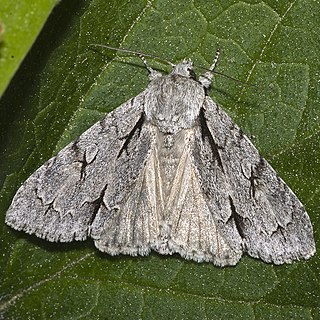
Acronicta is a genus of noctuid moths containing about 150 species distributed mainly in the temperate Holarctic, with some in adjacent subtropical regions. The genus was erected by Carl Linnaeus in his 1758 10th edition of Systema Naturae. Caterpillars of most Acronicta species are unmistakable, with brightly colored hairy spikes, and often feed quite visibly on common foliate trees. The hairy spikes may contain poison, which cause itchy, painful, swollen rash in humans on contact. The larva of the smeared dagger moth is unusually hairy even for this genus. Acronicta species are generally known as dagger moths, as most have one or more black dagger-shaped markings on their forewing uppersides. But some species have a conspicuous dark ring marking instead.

Apamea is a genus of moths in the family Noctuidae first described by Ferdinand Ochsenheimer in 1816.

Virbia is a genus of tiger moths in the family Erebidae. The genus was erected by Francis Walker in 1854.

Acontia is a genus of moths of the family Noctuidae. The genus was named by Ferdinand Ochsenheimer in 1816. Eusceptis, Pseudalypia and Spragueia are sometimes included in the present genus, but here they are tentatively treated as different pending further research. Many species of Tarache were also once placed here.
Aseptis is a genus of moths of the family Noctuidae. The genus was erected by James Halliday McDunnough in 1937.

Copivaleria is a monotypic moth genus of the family Noctuidae erected by Augustus Radcliffe Grote in 1883. Its only species, Copivaleria grotei, or Grote's sallow, was first described by Herbert Knowles Morrison in 1874. It is found in eastern North America, including Ontario, Tennessee, New York and Maryland.

Epiglaea is a genus of moths of the family Noctuidae.

Eupsilia is a genus of moths of the family Noctuidae.

Euxoa is a genus of moths of the family Noctuidae raised to Genus by the German entomologist, Jacob Hübner. The Genus is mostly confined to dry and semi dry areas in the Northern Hemisphere. There 130 species in Eurasia, a few in Africa, and 175 in North America. There are no species in the Genus in South-East Asia or in Australia. In North America, most species are found in Western regions. Of the North American species, 4 are endemic to Mexico. There is one species recorded from Chile, but this may be a mislabeled specimen. In real terms, species numbers do not equal species abundance. Some areas with few species have large numbers of the ones that do live there.

Feralia is a genus of moths of the family Noctuidae. The genus was erected by Augustus Radcliffe Grote in 1874.
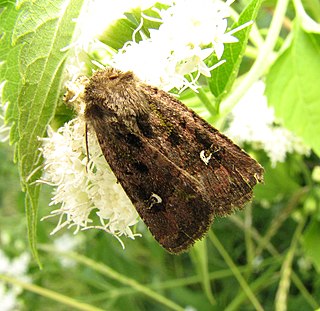
Lacinipolia is a moth genus in the family Noctuidae.

Lithophane is a genus of moths of the family Noctuidae. They spend the winter as adults. Some species are capable of feeding on other caterpillars or on sawfly larvae, which is rather uncommon among Lepidoptera.

Metaxaglaea is a genus of moths of the family Noctuidae.

Plagiomimicus is a genus of moths of the family Noctuidae. The genus was erected by Augustus Radcliffe Grote in 1873.
Stiria is a genus of moths of the family Noctuidae. The genus was erected by Augustus Radcliffe Grote in 1874.
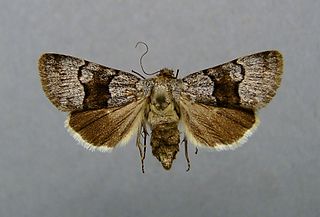
Sympistis is a genus of moths of the family Noctuidae. The genus was erected by Jacob Hübner in 1823.

Syngrapha is a genus of moths of the family Noctuidae.
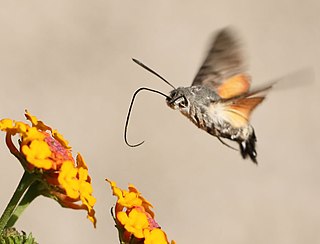
Macroglossini is a tribe of moths of the family Sphingidae described by Thaddeus William Harris in 1839.
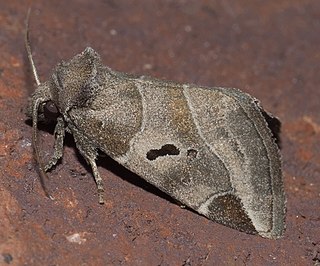
Stiriinae is a subfamily of owlet moths in the family Noctuidae. There are more than 20 genera and 130 described species in Stiriinae.
Parabagrotis insularis is a species of moth in the family Noctuidae. It is found in North America, where it has been recorded from southern Vancouver Island, along the Pacific Coast through California to near the border with Mexico. The species was described by Augustus Radcliffe Grote in 1876.